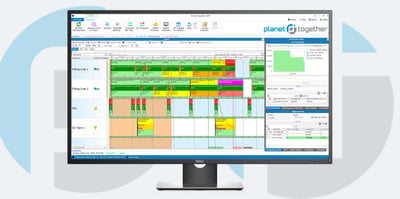Finite Capacity Scheduling
As a Production Planner, you're constantly juggling resources, timelines, and demands to ensure smooth operations and meet customer expectations in packaging manufacturing. In this intricate dance, one tool stands out as a game-changer: Finite Capacity Scheduling (FCS).
This blog will look into what FCS is, its benefits, and how integrating it with your ERP, SCM, and MES systems, such as PlanetTogether with SAP, Oracle, Microsoft, Kinaxis, Aveva, can revolutionize your production planning processes.

Understanding Finite Capacity Scheduling (FCS)
At its core, Finite Capacity Scheduling is a method used to optimize production schedules by considering the finite resources available within a manufacturing facility. Unlike traditional scheduling methods that may overlook resource constraints, FCS takes into account factors like machine capacities, labor availability, and material constraints to create schedules that are not just feasible but also optimized for efficiency.

Key Benefits of Finite Capacity Scheduling
Optimal Resource Utilization: FCS ensures that every resource in your manufacturing facility is utilized to its maximum capacity. By aligning production schedules with resource availability, you can minimize idle time and maximize throughput.
Improved On-Time Delivery: With FCS, you can create realistic production schedules that account for resource constraints and potential bottlenecks. This results in fewer delays and improved on-time delivery performance, enhancing customer satisfaction.
Reduced Inventory Costs: By synchronizing production with demand and resource availability, FCS helps minimize excess inventory levels. This leads to cost savings by reducing carrying costs and the risk of obsolescence.
Enhanced Flexibility: FCS allows for greater agility in responding to changes in demand or production constraints. Whether it's a rush order from a customer or a machine breakdown, FCS enables you to adjust schedules dynamically while minimizing disruptions.

Integrating FCS with ERP, SCM, and MES Systems
The true power of Finite Capacity Scheduling lies in its integration with other enterprise systems, such as ERP, SCM, and MES. These integrations enable seamless data exchange and synchronization across various functions, providing a holistic view of your manufacturing operations. Let's explore how integrating FCS with leading ERP, SCM, and MES systems like PlanetTogether with SAP, Oracle, Microsoft, Kinaxis, Aveva, can amplify its benefits:
Real-Time Data Accessibility: Integrating FCS with your ERP system ensures that production schedules are based on up-to-date demand forecasts, inventory levels, and other relevant data. This real-time visibility allows for better decision-making and responsiveness to changing market conditions.
Streamlined Workflows: By connecting FCS with MES systems, you can automate data capture from the shop floor and feed it directly into your scheduling process. This eliminates manual data entry tasks and reduces the risk of errors, streamlining your production workflows.
Comprehensive Planning Capabilities: Integrating FCS with SCM systems enables end-to-end visibility across your supply chain, from raw material procurement to finished goods distribution. This integration allows you to optimize production schedules based on not just internal constraints but also external factors like supplier lead times and transportation constraints.
Scalability and Future-Proofing: Leveraging a robust integration framework, such as PlanetTogether with SAP, Oracle, Microsoft, Kinaxis, Aveva, ensures that your production planning capabilities can scale with your business growth. Whether you're expanding into new markets or introducing new product lines, integrated FCS systems can adapt to your evolving needs.

Best Practices for Implementing FCS
While the benefits of Finite Capacity Scheduling and its integration with ERP, SCM, and MES systems are undeniable, successful implementation requires careful planning and execution. Here are some best practices to consider:
Define Clear Objectives: Clearly articulate the goals you aim to achieve through FCS implementation, whether it's reducing lead times, improving resource utilization, or enhancing customer satisfaction.
Collaborate Cross-Functionally: Involve key stakeholders from production, procurement, sales, and IT departments in the planning process to ensure alignment and buy-in across the organization.
Invest in Training and Change Management: Provide comprehensive training to your team members on how to use FCS effectively and communicate the benefits of the new system to mitigate resistance to change.
Monitor and Iterate: Continuously monitor the performance of your FCS system and gather feedback from users to identify areas for improvement. Be prepared to iterate and refine your processes based on lessons learned.
In packaging manufacturing, staying ahead of the competition requires more than just meeting production targets. It requires a strategic approach to production planning that maximizes efficiency, minimizes costs, and enhances customer satisfaction. Finite Capacity Scheduling, coupled with integration with ERP, SCM, and MES systems like PlanetTogether with SAP, Oracle, Microsoft, Kinaxis, Aveva, offers a powerful solution to achieve these objectives.
By embracing FCS and leveraging the latest technology, you can transform your production planning processes and drive sustainable growth in your packaging manufacturing business.
Are you ready to take your manufacturing operations to the next level? Contact us today to learn more about how PlanetTogether can help you achieve your goals and drive success in your industry.